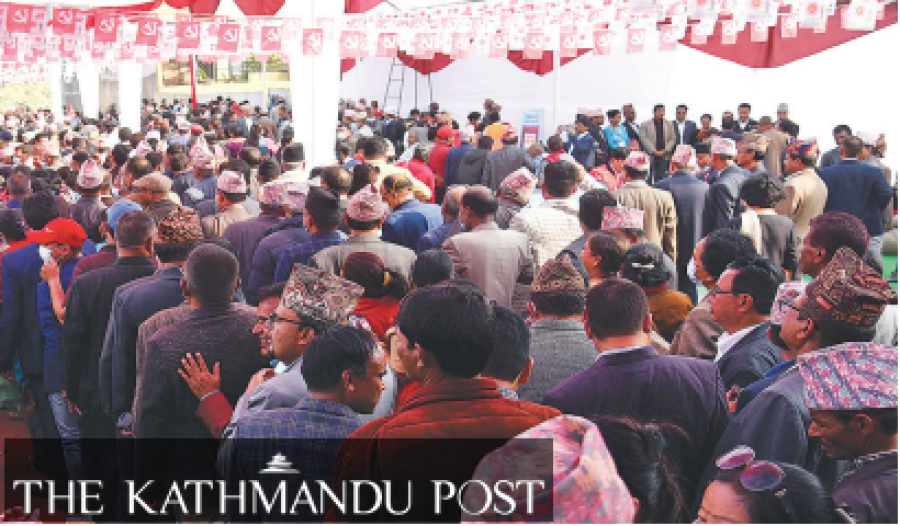Politics
Party politics getting costlier is a matter of concern
Citing the ballooning expenditures of party’s internal elections, observers say politics, which should serve people, is moving out of ordinary people’s reach.
Binod Ghimire
The Gandaki Election Committee of the Nepali Congress set a whopping Rs91,000 registration fee for a candidate for the provincial committee chair in the voting held on Friday in preparation for the ruling party’s upcoming general convention. One willing to contest for a provincial member had to post Rs31,000.
The election fee for other positions was no small amount either. In most of the districts, a general convention representative candidate had to post Rs15,000. The exorbitant fee charged for internal elections of the grand old party led to widespread criticism, prompting the party’s Central Election Committee to intervene.
The election committee has prepared a directive which sets Rs15,000 nomination fee to be paid by a provincial chairperson candidate and Rs30,000 by a central chairperson hopeful while Rs5,000 and Rs10,000 is paid by those running for provincial and central committee members.
“We have directed all subordinate committees not to charge exorbitant fees,” Jagannath Shrestha, a member of the Congress Central Election Committee, told the Post. “We will try to monitor such wrong practices.”
The Nepali Congress is busy holding its district and provincial conventions in the run up to the national convention scheduled for next week.
Charging exorbitant fees is not limited to the Congress party. It actually prevails in all political parties. The Rastriya Prajatantra Party, which has started its unity convention, has set Rs100,000 as the election fee to be charged from a chairperson candidate. It is Rs75,000 for a vice-chairperson candidate, Rs50,000 for a general secretary contestant and Rs15,000 for a central committee member hopeful.
“Not just the national politics, even party politics has become very costly,” Sagun Lawati, a candidate for the RPP’s central committee, told the Post. The parties set exorbitant fees for two reasons: first, to increase the collection and, second, to discourage candidates, say party leaders.
In its general convention concluded on Tuesday, the CPN-UML had set Rs15,000 as the fee for party chairperson candidacy and Rs5,000 for a party member contesting for the central committee. “We wanted to have a nominal fee but there was fear that it would prompt unnecessary candidacy,” Bijay Subba, chairperson of the Central Election Commission of CPN-UML, told the Post.
The recent conventions of the parties suggest that the increasing cost of engaging in internal politics could make national politics highly expensive.
A study carried out by the Election Observation Committee (EOC), Nepal showed that the government, political parties and candidates spent an estimated Rs131.63 billion in total in the 2017 elections.
The report revealed that the government spent Rs34.72 billion while the candidates and their supporters spent Rs96.91 billion in total. If the figures from the committee are anything to go by, per voter cost during the three-tier elections accounts for Rs8,492. There were a total of 15,427,938 eligible voters in the elections.
Another study report by the committee showed Rs69.42 billion was spent in the three phases of local elections alone with per voter cost amounting to Rs4,923. Even political party leaders admit that the elections are getting costlier, making it increasingly difficult for ordinary people to contest the polls.
Addressing party cadres in Pokhara in October, Janata Samajbadi Party chair Upendra Yadav said costlier elections were a cause for serious concern.
“Poor and middle class people cannot contest even ward level elections. The electoral system favours contractors and the mafia,” Yadav said.
Those who have closely followed the election expenditure in Nepal say the increase in election costs has multiple consequences. They claim that it not only obstructs honest people from joining politics but also fuels corruption.
Binod Sijapati, an economist who led a study on the expenditures in 2017 elections for the EOC, said it is unfortunate that millions of rupees are being poured into the internal conventions of political parties.
“Election costs are increasing both in party and national politics because nobody asks about the source of funding,” Sijapati told the Post. “The critical mass must demand to know where the money comes from.”
He said the business community and interest groups fund political parties and leaders during the elections. The funding is done with the hope that the particular party and leader will work for their benefit when they rise to power, Sijapati said. “The money spent is not an expenditure but an investment done with a profit motive.”
Observers say politics will gradually be controlled by interest groups and a certain class of people if the ballooning cost is not checked.
“Honest people will be sidelined gradually as they lack the money to compete,” Kapil Shrestha, a former professor of Political Science at Tribhuvan University who chairs the National Election Observation Committee, told the Post. “Having elections alone makes no sense if not everyone can contest them.”
Since the beauty of democracy is mass consciousness, observers say it is necessary to make the general public more aware in order to control the bad practice.
“The only way to discourage the practice is to reject an extravagant candidate,” said Sijapati.




 13.12°C Kathmandu
13.12°C Kathmandu














